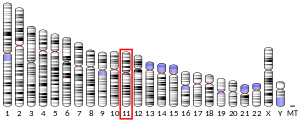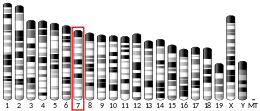DCHS1
Protein dachsous homolog 1, also known as protocadherin-16 (PCDH16) or cadherin-19 (CDH19) or cadherin-25 (CDH25) or fibroblast cadherin-1 (FIB1), is a protein that in humans is encoded by the DCHS1 gene.[5][6]
Function
This gene is a member of the cadherin superfamily whose members encode calcium-dependent cell-cell adhesion molecules. The encoded protein has a signal peptide, 27 cadherin repeat domains and a unique cytoplasmic region. This particular cadherin family member is expressed in fibroblasts but not in melanocytes or keratinocytes. The cell-cell adhesion of fibroblasts is thought to be necessary for wound healing.[5]
Clinical significance
Mutations in this gene have been shown to cause mitral valve prolapse[7]
References
- 1 2 3 GRCh38: Ensembl release 89: ENSG00000166341 - Ensembl, May 2017
- 1 2 3 GRCm38: Ensembl release 89: ENSMUSG00000036862 - Ensembl, May 2017
- ↑ "Human PubMed Reference:".
- ↑ "Mouse PubMed Reference:".
- 1 2 "Entrez Gene: dachsous 1 (Drosophila)".
- ↑ Matsuyoshi N, Imamura S (June 1997). "Multiple cadherins are expressed in human fibroblasts". Biochem. Biophys. Res. Commun. 235 (2): 355–8. doi:10.1006/bbrc.1997.6707. PMID 9199196.
- ↑ "Mutations in the DCHS1 Gene Cause Mitral Valve Prolapse In Humans". Ashg.org. Retrieved 2013-11-22.
Further reading
- Rose JE, Behm FM, Drgon T, et al. "Personalized smoking cessation: interactions between nicotine dose, dependence and quit-success genotype score". Mol. Med. 16 (7–8): 247–53. doi:10.2119/molmed.2009.00159. PMC 2896464. PMID 20379614.
- Nakajima D, Nakayama M, Kikuno R, et al. (2001). "Identification of three novel non-classical cadherin genes through comprehensive analysis of large cDNAs". Brain Res. Mol. Brain Res. 94 (1–2): 85–95. doi:10.1016/S0169-328X(01)00218-2. PMID 11597768.
This article incorporates text from the United States National Library of Medicine, which is in the public domain.



